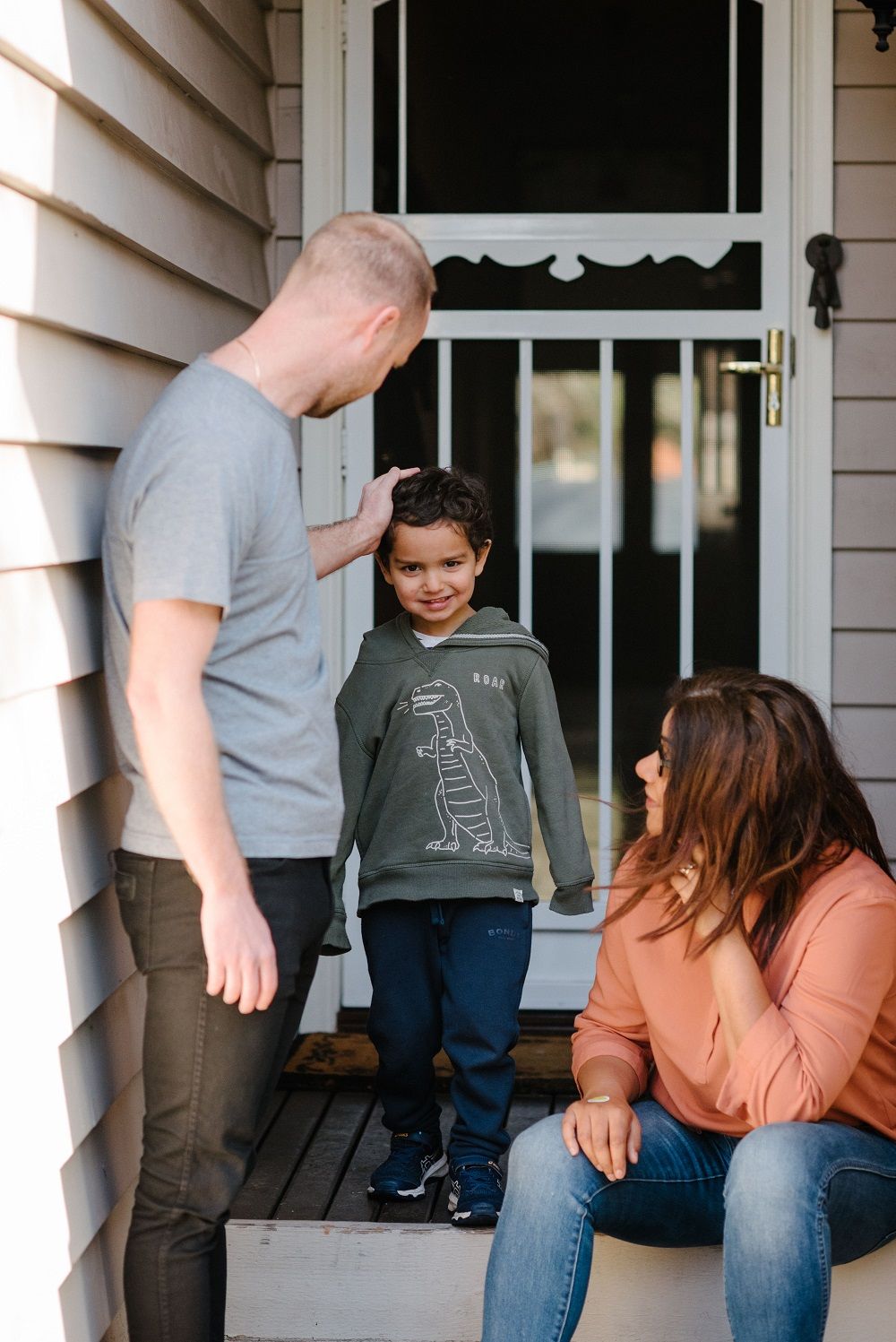Co-Parenting For Separated & Divorced Parents
Key points:
- Co-parenting can be hard. Acknowledge this and ensure you have smart ways of coping.
- Make it all about the kids. Focus on their wellbeing and what’s best for them.
Raising kids is tough at the best of times, but when going through a divorce or separation it can sometimes start to feel impossible. Maybe all you want to do is cut ties with your ex. We get it. But effective co-parenting is important for your child’s wellbeing.
Co-parenting refers to how parents work together in their roles as caregivers. And we won’t sugar coat it — it can be hard. Like really hard. But with the right strategies you can create a healthy and effective co-parenting relationship. When you do, you’ll see the positive impact it has on your kids.
Forming a team with your co-parent
Time and time again, people say the trick to successful co-parenting is to focus on the children. It’s almost like being in an old rock band. You can’t stand each other offstage but for the sake of the audience you find ways to cope and kill it come the gig.
You might have past hurts, old arguments, gripes, or things that drive you up the wall, but at the end of the day the key is to act as a team with your co-parent as much as possible and focus on what’s best for your kids. (Be warned, we’re going to say “what’s best for your kids” a lot in this article.)
Setting clear expectations and boundaries
Before even thinking about the actual job of parenting, it’s important to set boundaries and expectations between you and your co-parent.
Keep it civil
It can be tough to stay pleasant when interactions may be emotionally charged. Here are a few ideas that, if you can agree on them, will make everyone’s lives much easier.
- Never criticize or speak negatively about your co-parent in front of your children.
- Don’t fight in front of the kids. We’ve all seen the movies, it never ends well.
- Keep conversations with your co-parent focused on your kids. Remember, they’re what matter most here.
- Regularly communicate with your co-parent. Try setting specific days or times to get in touch. And if the mere sight of them makes you mad, simply stick to phone calls or email.
- Most importantly, agree to never use the kids as messengers.
Maintain consistency
Once you’ve agreed on how you’re going to interact with your co-parent, it’s time to start thinking about how you can both make things as easy for your kids as possible.
One of the biggest ways you can help a kid through a divorce is to ensure consistency. Of course, it’s important for kids to encounter different perspectives and learn to be flexible — but only up to a certain point. Whether they’re aware of it or not, children crave consistency. You and your co-parent can join forces to try and create more stability for them across households.
Consistent rules
If you can come up with family rules for behavior that are the same at your house and your co-parent’s house, then children find it easier to understand what is expected of them and this makes it easier to apply a consistent approach to discipline.
However, you don’t want to be fighting with your ex about different rules at the different houses. You simply can’t control that. While it’s good to have consistency between houses, don’t start a war over differences. Just focus on what you can control yourself, that is, having clear rules at your house and calmly sticking to them.
Consistent discipline
Disciplining your kids can be a huge bone of contention, even for couples who are together. If your kid gets away with something at your place but the same misbehavior is disciplined by your co-parent, well that’s just not fair on anyone and this can be confusing for children.
Using similar discipline strategies between households reduces this confusion and helps to ensure positive child behavior. For example, if not following certain rules leads to a time-out in your partner’s home, consider using the same consequence in your house too.
Consistent reward strategies
It’s also important to use similar reward strategies across households. For example, if your partner is trying to encourage your child to talk in a quiet voice instead of yelling at home by using reward strategies, using similar reward strategies in your house will help promote this positive behavior.
Consistent routines
It also helps to match up household schedules where possible. Aim for a similar morning routine, the same approach to screen time, and a consistent bedtime. This will help children adjust and feel comfortable when moving between two households.

Communication and dealing with co-parent conflict
The best way to achieve consistency in rules, discipline strategies, reward strategies and household routines, is to communicate effectively with your co-parent. Think about how and when you’ll communicate with your co-parent about your kids. What will you do when you disagree on discipline strategies? Effective communication can be incredibly difficult, but it all comes down to your mindset.
Take a step back and think about things logically. Your communication with your co-parent has one key purpose — your child’s wellbeing. Remind yourself how any communication will affect your child, and put them at the center of all conversations. And remember – nutting out effective communication techniques will make your life easier too by reducing the stress of co-parenting. Less stress is always a win.
Here are a few things that might help:
- Managing your emotions and approaching interactions like a business transaction.
- Making requests rather than stating a specific course of action. For example: “Would it be okay if we tried…”
- Listening. Even if you don’t agree with everything, listening is a great tool to help dilute anger. Plus it’s easy, just stay quiet and let them explain themselves.
- Trying to compromize. At the end of the day just keep asking yourself “What impact is this really having on my child?”
- Making a commitment to communicate regularly, such as at drop-offs or pick-ups from one household to another.
Remember that by communicating regularly and successfully dealing with conflict you’re creating a space where your child can feel happy and loved by both of their parents. And that’s what’s most important.
As an added bonus, you’ll be modeling effective communication and problem solving strategies for your kids, which will help reduce issues such as sibling conflicts and improve their overall wellbeing.

Helping your child through divorce
When in the middle of the minefield that is co-parenting, it can be easy to get wrapped up in our own emotions and forget to check in with our kids.
Ensure you set aside quality time with you and your children. Don’t shy away from talking openly about the separation and their feelings. Let them know they are safe, loved, and that they’ll never be abandoned by either parent. We don’t have to tell you how complicated separations can be, so imagine what it must be like for a child trying to figure it all out. Give them time to process and be prepared to talk about it as much as they need.
If you’re up for it you could even try spending time together with your co-parent and the kids. A family dinner once a month can be a great way to ensure good communication and positive relationships – both of which are vital to ensuring your kids’ wellbeing.
Take care of yourself
It all sounds like a lot doesn’t it? But don’t worry, you’ve got this. One element of creating a healthy co-parenting relationship that often gets overlooked is actually stopping to look after yourself. Yes, you.
A healthy, happy parent is what’s best for your kids. And while co-parenting can get stressful – especially around big family events like birthdays or holidays – you need to make sure you’re doing things that help you feel positive and healthy. Maintain relationships with friends and family, eat well, exercise, and make time for your own hobbies. All of this will help you keep a positive attitude and set a great example for your kids.
If you feel like you’re struggling, don’t be afraid to get professional support. Your local doctor can give you a referral to a professional or you can check out our list of useful resources.
Remember, all the hard work you’re putting in is going to make such a difference to your kids. Co-parenting is no walk in the park, and you’re a legend for making it work.
Want to learn more?
Movember launched Family Man to improve the confidence and mental health of dads.
Learn how to master kick-ass parenting strategies by getting started with Family Man. It’s an interactive parenting video series that's expert-backed and funded by Movember.
If research is your thing take a closer look at the evidence behind Family Man.
Or learn more before diving in.